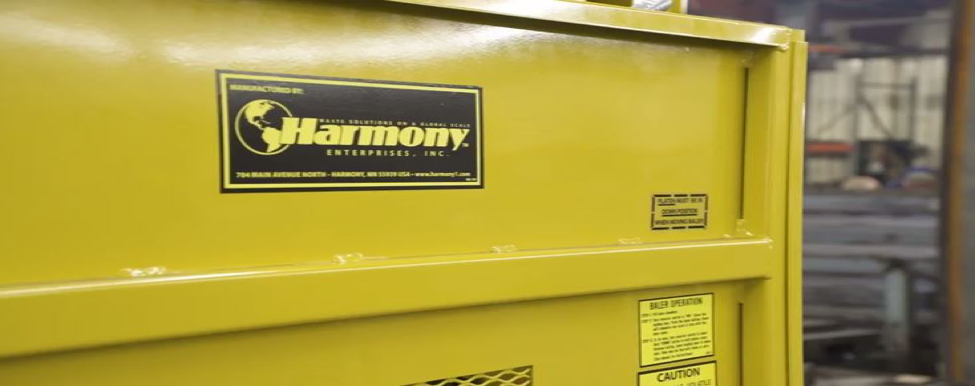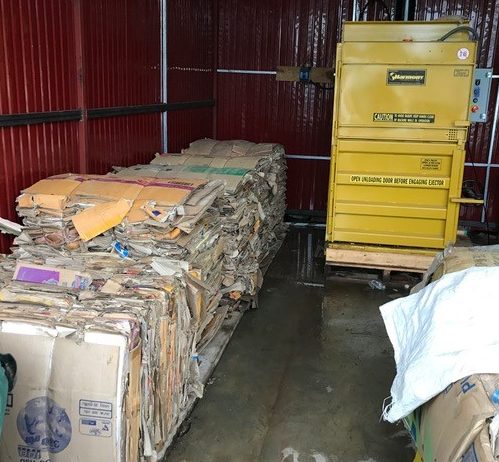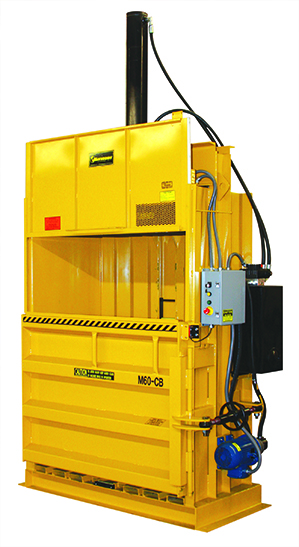How Do You Know When You Need a Baler?
Business owners and facilities managers can easily tell when it is time to purchase a baler. Commodities like cardboard, aluminum, paper, textiles, plastics, and non-ferrous metals can accumulate and create unsafe work environments. It is expensive to pay waste haulers to take these items away with the rest of the trash. It is also not environmentally sustainable to add these valuable items to the already overpopulated waste stream and shrinking landfills. These goods also represent a potential additional revenue stream for any business.
What You Need To Know Before Buying a Baler
 Once you have made the decision to buy a baler that will clean up your back room, save you money on hauling, improve the environment, and add cash in your pocket, you need to know where to look, and what to look for.
Once you have made the decision to buy a baler that will clean up your back room, save you money on hauling, improve the environment, and add cash in your pocket, you need to know where to look, and what to look for.
Be sure to engage with companies that have a history of satisfied customers, quality products, and reputable service. Talk with them about the specific needs of your business. The last thing you want to do is invest in a piece of equipment that is not the right solution for your particular application.
When dealing with baler manufacturers, here are 10 questions they should ask you at the beginning of the sales process and that you should be able to answer.
1.What is the commodity that will be baled?
 Whether you plan to bale one product or a variety of products (PET plastic, cardboard, non-ferrous metals, etc.) this will be the first filter used in narrowing down the baler that is most appropriate for your use.
Whether you plan to bale one product or a variety of products (PET plastic, cardboard, non-ferrous metals, etc.) this will be the first filter used in narrowing down the baler that is most appropriate for your use.
2. Do you plan on recycling the baled commodity?
If you are banking on a revenue stream to assist in the immediate return on your investment, you will need assistance in making sure there are a recycler and a market that supports your goals in your geographic area.
3. What is the quantity and frequency with which it will be baled?
How much and how often you will be baling will help to determine the size and power of the baling equipment you will need. It also is a good indicator for life-expectancy of your equipment.
4. What is the size of the bale that is desired?
Most recyclers will take any size bale but may charge you to break up smaller bales to create a “mill-sized” bale for maximized shipping. Many balers can create these “mill-sized” bales and help you to optimize your recycling and reclamation efforts.
5. What’s the ceiling height and operational footprint available in your work area?
Because different balers have different sized cylinders and designs, ceiling height and the operational footprint is a major concern. Vertical balers help to reduce the operational footprint. You also want to make sure that there is sufficient clearance in a pre-built work area to bring the baler in on its side and then tip it up for installation.
6. What voltage is available at your location?
 Single-phase or three-phase voltage requirements differ by geographic location, building, and even baler. Be sure to inquire about which voltage your business can support, and which voltage your new baler comes with.
Single-phase or three-phase voltage requirements differ by geographic location, building, and even baler. Be sure to inquire about which voltage your business can support, and which voltage your new baler comes with.
7. What type of budget do you have for a baler?
This budget question is often the first question asked, but not necessarily the most important one. If the baler manufacturer you are working with is honest, they will want to help you get the right solution for your needs, even if it does not include the highest margin member of their product line. You should also find out if there are baler rental programs available in addition to purchasing.
8. Do you need the baling equipment by a certain date?
Manufacturers can typically work with you to produce and install your new equipment in a timely manner. However, lead times can change due to several factors, so make sure that your timeline is agreed upon prior to purchasing.
9. What other options might be needed to make the baler user-friendly and fit your needs the best?
The sales staff working with you should be knowledgeable in telling you what options and accessories are needed to optimize your baling solution. Items such as wire guides, filters, bale full lights, etc., can all be added to make your baling process as efficient as possible.
10. What type of post-sale service do you need for the baler?
Another consideration is what type of warranty and service plans are offered with your equipment. Structural warranties of three years should be standard. Preventive maintenance plans and 24-hour available customer service should also be a consideration when choosing a baler and manufacturer.
Experience Harmony
Harmony Enterprises has been providing customers with the right baler solution for nearly half a century. Our experienced sales staff is here to assist you in answering these important questions to ensure your complete satisfaction. Our website products page includes a helpful filter that will allow you to better select the baling solution that will work for your business.
Harmony offers long-lasting quality equipment and installation, rental options, 24-hour customer service, and industry-leading warranty and preventive maintenance plans as part of our true partnership approach with each customer.
To learn more about our extensive line of vertical and horizontal balers, call us at 800-568-2320, or contact us today!
Contact Harmony
